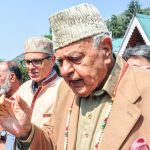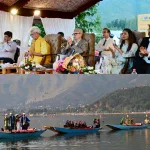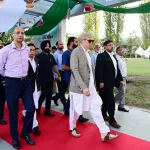After the successful completion of the Assembly Elections in Jammu and Kashmir there is a need to address the issues concerning the Union Territory (UT).No one can deny that the political fault lines present in the erstwhile princely state have not been erased. There may be a lull but the fault lines are dormant. These become evident when the situation reaches the precipice. Political maturity demands that the governance in Jammu and Kashmir should be inclusive catering to the aspirations to both Jammu and Kashmir respectively. The poll results too must be analysed with clinical precision. The mandate given by the masses may have enabled the stable government but the message has to be read between the lines. Kashmir has voted to in a bloc for a party that is a votary of the special status and Article 370 retaining the autonomy. People of Kashmir have voted for the narrative that is deviant from the vote given by the masses in Jammu region. In Jammu people have posed faith in the Bhartiya Janta Party (BJP).BJP has been forthright in its agenda of mainstreaming Jammu and Kashmir by neutralising Article 370 and 35 A, which it did in 2019.The political reorganisation of Jammu and Kashmir was its ultimate outcome, leading to the creation of two union territories -Jammu and Kashmir along with Ladakh. It is a known fact that Jammu and Kashmir regions have been pitted against each other when Shree Amarnath Land Row led to the regional divide. It created polarisation among the masses of the two regions that witnessed the comprehensive economic and political standstill. That agitation changed the political landscape of Jammu and Kashmir. It enabled the BJP to improve its graph in Jammu and gain political confidence. People of Jammu started recognising BJP as the torchbearer of its demands. But politics is an art of the possible. In politics there are no permanent friends and foes. BJP joined hands with PDP to form the government on the basis of the “Agenda of Alliance”. It eroded the political base of both the parties. Though BJP has managed to stage a comeback in Jammu in the 2024 Assembly Elections but PDP has not been forgiven by the voters. National Conference has been able to win a few seats from Jammu regions making it clear that its cadres are intact in the entire erstwhile princely state. If the mandate given by the people in these Assembly Elections is analysed clinically then it won’t be an exaggeration to say that the verdict has been a referendum for the regional aspirations of both the regions, with each region posing faith in a particular party and ideology. If these aspirations are not accommodated in the governance then the dormant undercurrents will have a devastating effect on the socio-political space of Jammu and Kashmir. After a decade of waiting with patience, the people of Jammu and Kashmir cannot afford another regional polarisation. The National Conference-Congress Alliance has a task cut out. It has to balance the governance deficit that has created a lot of bad blood between Jammu and Kashmir regions. National Conference President, Dr. Farooq Abdullah is right when he says, “We have to minimise the differences that they have created between Jammu, and Kashmir. Our endeavour should be that the Hindus there have this confidence in us that we will think about them in the same manner as about Kashmir. We will not differentiate between the two. So what that they did not vote. It is our duty to solve their problems”. Underlining the challenges for the new government he was clear “the biggest challenges are inflation and unemployment. We have to create opportunities for our youth.” The new alliance must internalise the message of the former Chief Minister and National Conference President, Dr. Farooq Abdullah that the two regions will have to be equally patronised. So that peace and stability must prevail in Jammu and Kashmir.
Addressing Political Fault Lines in J & K

Sign Up For Daily Newsletter
Be keep up! Get the latest breaking news delivered straight to your inbox.
By signing up, you agree to our Terms of Use and acknowledge the data practices in our Privacy Policy. You may unsubscribe at any time.
Leave a Comment Leave a Comment
Stay Connected
Latest News
Recent Posts
- J&K govt warns meat sellers, e-commerce platforms to comply with food safety rules
- Youth voices now roar in stadiums, not streets: LG Sinha
- JKP at forefront in fight against human trafficking: Spl DG Coordination
- Khelo India Water Sports Fest marks new era for J&K youth: CM
- Woman’s death in Shopian sparks protests in Anantnag







